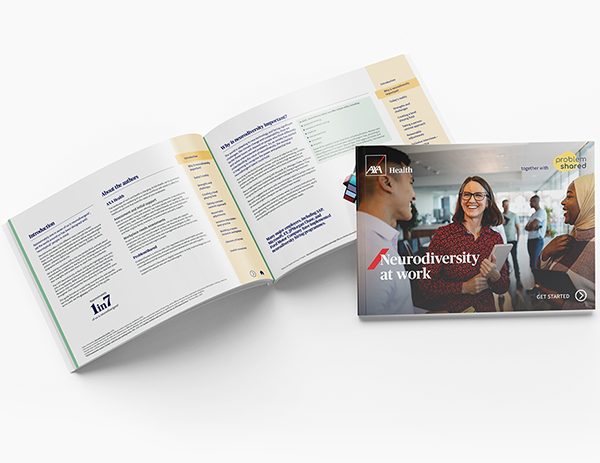
Neurodiversity Assessment and Support service

67% of employers say that improving inclusivity is a priority.
- Innovative online service with access to experts across the UK
- Initial needs assessment, typically available five working days from booking, following a GP
- referralFirst of its kind UK corporate private healthcare benefit.
Understanding, supporting and embracing neurodiversity in the workplace
Neurodiversity refers to the different ways people’s brains think or interpret information. It’s thought that around one in seven people in the UK is neurodivergent.1 These differences, which are as natural a variation as the colour of our eyes, include alternative thinking styles, such as ADHD or autism, and specific learning differences like dyslexia.
With the right support, neurodivergent people can harness their skills and better manage their challenges. But without an awareness or understanding of their condition getting that support can be difficult. And, for some, getting assessed or gaining expert guidance can be long and complex.2
Working together with ProblemShared, a clinician-led online mind-health provider, we’re bringing you our Neurodiversity Assessment and Support service.
Connecting your teams with expert advice and guidance
This brand-new offering connects your client’s people and their eligible family members (aged seven and over) to ProblemShared’s innovative digital platform and a network of expert practitioners, including counsellors, nurses, therapists and psychiatrists. This gives employees access to timely initial needs assessments and, where appropriate, assessment and expert early guidance for:
- autism
- attention deficit hyperactivity disorder (ADHD)
- dyslexia
- dysgraphia
- dyscalculia.
Neurodiversity Assessment and Support can be added as a standard opt in3 as part of Advance, our corporate health scheme.
How it works
A timely initial needs assessment
Following a GP referral, your employees and their eligible family members can arrange a 45-minute video consultation with an expert practitioner to discuss their challenges, answer questions and map out a potential care plan. All they need is to contact us with the details of their referral.
An innovative online dashboard
Our clinical customer care team will set individuals up on ProblemShared’s secure digital platform. This offers a personal dashboard to manage assessments, fill out associated questionnaires, and access the resource library.
Comprehensive online assessments
Employees will be referred for assessment where appropriate. These are specific to individual conditions and will be conducted by video over ProblemShared’s secure platform. If the initial needs assessment suggests an employee might have multiple conditions, they’ll have a separate assessment for each.
Timely feedback and detailed reports
Following an assessment, feedback is often provided on the same day. A comprehensive report will be sent out to them within four weeks. With the right support, neurodivergent people can harness their strengths and manage their challenges.
Support beyond assessment
When it’s needed, early guidance and support may be recommended, including group sessions for ADHD and autism, educational support, and medication reviews for ADHD.
“The power of digital technology to conduct high quality remote neurodevelopmental assessments has enabled more families than ever to access a service from the comfort of their own home”
– Ellie Greenhow, Neurodevelopmental Clinical Lead/Occupational Therapist, ProblemShared

Supporting neurodiversity at work
Creating inclusive workplaces means building an environment and developing a culture where everyone can thrive. Discover more ways you can help your neurodivergent talent to harness their unique skills, such as analytical thinking, complex problem solving, creativity, innovation and empathy.
Check out our latest blogs, articles and webinars to help you promote supportive environments for your neurodivergent people.
The first of its kind
Working with ProblemShared, we've become the first UK private healthcare provider to offer the benefit of assessment and early support for neurodevelopmental challenges as a standard option on corporate schemes, simply opt in from renewal.
1Aston University, Neurodiversity Guide, 2020.
2Autistic children wait up to five years for an NHS appointment, The Guardian, 2022.
3The size of your client’s employee and dependant populations will influence their claims experience. This opt in benefit will be priced into your scheme and is available on Advance corporate health plans/schemes only.
4REBA and AXA Health Employee Wellbeing Research Report, 2022.